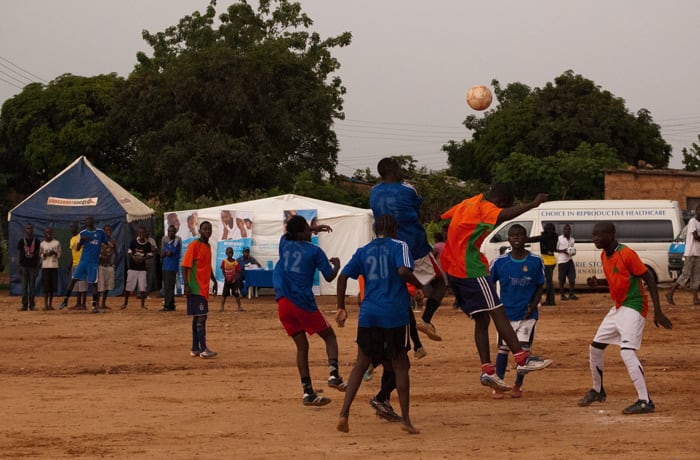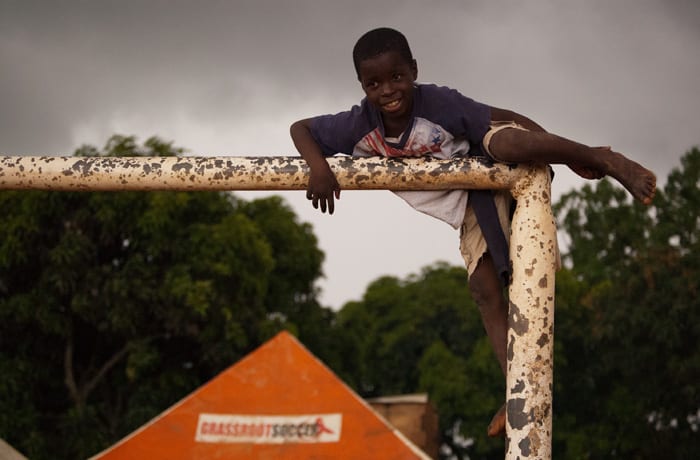In 2012, GRSZ graduated 10,800 youth, tested 9,000 individuals and made 450 referrals to local health services.
Grassroot Soccer was originally founded in Zimbabwe in 2002 by four professional African soccer players. Having witnessed the devastating impact of AIDS on families and communities, they decided to act.
Grassroot Soccer's founders shared a vision of using Africa's passion for soccer as a powerful tool in the fight against AIDS. To date, more than 572,000 young people have graduated from GRS programs in 19 countries around the world. Grassroot Soccer aims to educate one million young people and inspire them to live healthier, more productive lives.
Grassroot Soccer's innovative model
Grassroot Soccer trains community-based youth role models to deliver comprehensive HIV prevention and life-skills education. These 'Skills Coaches' use soccer-based activities and discussions to engage youth in vital conversations about HIV/AIDS. This empowers participants with the life skills needed to adopt healthy behaviours and protect themselves, their sexual partners and their communities from HIV.
Grassroot Soccer Combination Prevention Model
Behavioural Prevention
Build comprehensive knowledge
Challenge harmful social norms
Motivate youth to stay healthy
Build key life skills (e.g. decision making)
Build self-efficacy and self esteem
Structural Prevention
Provide access to youth-friendly services
Provide access to healthy activities (e.g. soccer leagues)
Help youth to stay in school
Create community support networks
Create job skills for youth
Biomedical Prevention
Early HIV testing (VCT)
Male medical circumcision (MMC)
Youth friendly ARV provision
STI treatment
Prevention of mother to child transmission
Support treatment adherence
Grassroot Soccer Zambia (GRSZ)
Grassroot Soccer Zambia (GRSZ) was launched in 2005 and has since built a strong presence working in schools and communities across Lusaka and beyond. The GRSZ model is focused on providing an all-inclusive package of services for every participant.
GRSZ has partnered with Barclays Bank, UNICEF, Football for Hope, and the Elton John AIDS Foundation.
GRSZ Programs
Skillz
The soccer-themed Skillz Curriculum is Grassroot Soccer Zambia's primary brand. Blending sport with active learning and participant-led discussions, this 10-practice intervention has been extremely successful in changing youth understanding and perception of HIV/AIDS. At the end of each Skillz Intervention, GRSZ brings intervention groups together to share what they have learned at graduation ceremonies. At these events, all participants are offered an opportunity to receive HIV counselling and testing.
Skillz Street
In response to overwhelming research promoting the value of girls' participation in sport coupled with the need for effective HIV prevention, GRS launched Skillz Street in early 2010. Led by GRS' Skillz Coaches, and enhanced by the unique culture developed within Skillz programs, Skillz Street creates a safe space for adolescent girls to play soccer, take action in their community, provide incentives for girls to access community health services and have vital conversations about HIV and AIDS.
Skillz Street uses soccer as the hook to reach marginalised young women and challenge widely held social norms. Throughout their time in Skillz Street participants are able to access critical sexual and reproductive health services, in particular HIV testing and treatment. Skillz Street leagues involve girl teams from neighbouring communities that seldom have the opportunity to compete with teams from other areas. These leagues are also the platform for Skillz Interventions, which take place pitch-side, and focus on key issues facing girls in Zambia such as gender-based violence, negotiating safe sex, older partners and accessing health services.
Skillz+
In 2012, GRSZ began implementation of its new Skillz+ curriculum in which HIV positive GRS coaches use soccer-based activities to guide HIV positive youth through issues such as acceptance, disclosure, healthy living and adherence. GRSZ pairs its coaches with HIV positive youth, providing immediate results delivery and disclosure, and clinical visit accompaniment. This ensures an effective continuum between testing, referral and follow up. Currently, Skillz+ is implemented at several Anti-Retroviral Therapy (ART) clinics in Lusaka. One of the primary goals of Skillz+ is to increase rates of retention in Anti-Retroviral (ARV) care – a serious problem for treatment programs in sub-Saharan Africa.
Bridging the Gap
In 2010, in collaboration with the Elton John AIDS Foundation (UK), GRSZ launched the 'Bridging the Gap' project (BtG), which is heavily focused on HIV Counselling and Testing (HCT), referrals to treatment, and maximizing adherence to treatment for HIV+ youth. BtG is a forward-thinking combination prevention program designed to increase the number of positive youth identified, and adhering to their treatment programs. GRSZ works with its partners to link effective HIV prevention education with HCT, treatment and care. GRSZ enables all of its program participants and those that it reaches through its soccer events to access HIV testing. Since the beginning of the BtG project, more than 9,500 youth have been tested.
Monitoring and Evaluation
Ensuring that its programs are having their intended effect is a primary concern of GRS. As a result, GRSZ has invested heavily in the development of its Monitoring & Evaluation Department (M&E). The data gathered and analyzed by the GRSZ M&E Department is instrumental to the development of new Skillz curricula as it aids in the identification of areas that need improvement.
Current research in Zambia is investigating whether GRSZ interventions and coach support lead to increased uptake of HIV Counselling and Testing (HCT) services and reduce the number of HIV+ patients that are lost to follow up. Mid-line results of this study are extremely encouraging and show that GRSZ graduates are more than 4.5 times more likely than the national average to be tested for HIV.
- Grassroot Soccer Combination Prevention Model
- Behavioural Prevention
- Build comprehensive knowledge
- Challenge harmful social norms
- Biomedical Prevention
- Early HIV Testing (VCT)
- Male medical circumcision (MMC)
- Youth friendly ARV provision
- STI treatment
- Prevention of mother to child transmission
- Support treatment adherence
- Structural Prevention
- Provide access to youth friendly services
- Provide access to healthy activities
- Help youth to stay in school
- Create community support networks
- Create job skills for youth
- GRSZ Programs
- Bridging the Gap
- Skillz
- Skillz Street
- Skillz+
The combination prevention model includes: behavioural prevention ( build comprehensive knowledge, challenge harmful social norms, motivate youth to stay healthy and build life skills), structural prevention (provide access to youth friendly services, help youth to stay in school, create community support networks and create job skills for youth) and biomedical prevention.






